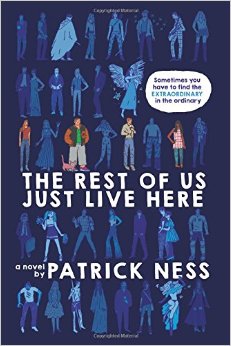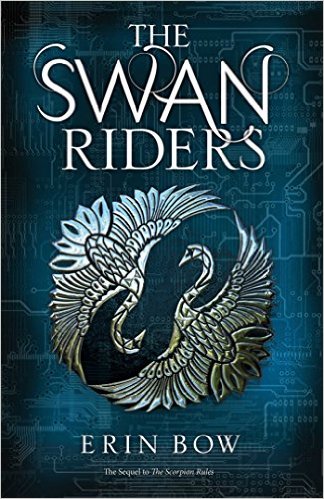Monthly Archives: September 2016
The Rest of Us Just Live Here
 The Rest of Us Just Live Here
The Rest of Us Just Live Here
HarperTeen
October 6, 2015
336

ALA Best Fiction for Young Adults * Cooperative Children’s Book Center CCBC Choice * Michael Printz Award shortlist * Six starred reviews * Kirkus Best Book of the Year * VOYA Perfect Ten * NYPL Top Ten Best Books of the Year for Teens * Chicago Public Library Best Teen Books of the Year * Publishers Marketplace Buzz Books * ABC Best Books for Children * Bank Street Best Books List
A new YA novel from novelist Patrick Ness, author of the Carnegie Medal- and Kate Greenaway Medal-winning A Monster Calls and the critically acclaimed Chaos Walking trilogy, The Rest of Us Just Live Here is a bold and irreverent novel that powerfully reminds us that there are many different types of remarkable.
What if you aren't the Chosen One? The one who's supposed to fight the zombies, or the soul-eating ghosts, or whatever the heck this new thing is, with the blue lights and the death?
What if you're like Mikey? Who just wants to graduate and go to prom and maybe finally work up the courage to ask Henna out before someone goes and blows up the high school. Again.
Because sometimes there are problems bigger than this week's end of the world, and sometimes you just have to find the extraordinary in your ordinary life.
Even if your best friend is worshipped by mountain lions.
Review:
“The Rest of Us Just Live Here” is one of the most unusual books I have ever read.
The beginning of every chapter tells what the “Indie Kids” are up to, which is the stuff typically found in young adult fiction that is not realistic. There were so many lines centering around them that had me laughing I couldn’t even begin to narrow it down to only one example. The real story centers around a group of friends who are just living their normal lives on the outside, not really involved with what’s going on. None of them are “the chosen ones.”
All of the characters are well-developed, including the secondary ones, and are going through the typical growing up issues all of us face at one time or another. The group is diverse in almost every way imaginable, and that really adds another level of enjoyment to it all. Most importantly, there are some very important messages hidden within the fun and entertainment. I’ll let you find those out for yourselves.
As an aside, there is a wonderful portrayal of OCD found in the main character, Mikey. It isn’t the main focus, but I’m sure many readers will relate.
I highly recommend “The Rest of Us Just Live Here” to any older young adult or adult who is looking for a book that is capable of having them shifting between laughter and tears.
Content Warnings:
Language, Sexual Situations, Violence, Underage Drinking, Discussion of Eating Disorders
The Swan Riders (Prisoners of Peace, Book 2)
 The Swan Riders
The Swan Riders
Prisoners of Peace, Book 2
Margaret K. McElderry Books
September 20, 2016
Hardcover
384

Treacherous twists await Greta as the stakes get even higher in this stunning follow-up to the “masterful” (School Library Journal, starred review) novel, The Scorpion Rules.
Greta Stuart has become AI. New transmitters have silvered her fingerprints. New receptors have transformed her vision. And the whole of her memory has become one book in a vast library of instant knowledge. Greta is ready to rule the world.
But the new technology is also killing her.
Greta is only sixteen years old, but her new enhancements are burning through her mortal body at an alarming rate. Of course the leader of the AIs, an ancient and compelling artificial intelligence named Talis, has a plan. Greta can simply do what he’s done when the time comes, and take over the body of one of the Swan Riders, the utterly loyal humans who serve the AIs as part army, part cult.
First though, Greta will have to find a way to stay sane inside her new self. Talis’s plan for that involves a road trip. Escorted by Swan Riders, Greta and Talis set out on a horseback journey across the strange and not-quite-deserted landscape of Saskatchewan. But there are other people interested in Greta, people who want to change the world…and the Swan Riders might not be as loyal as they appear…
Review:
I’m not even sure where to begin with “The Swan Riders” aside from saying that Erin Bow somehow managed to outdo “The Scorpion Rules.”
I don’t want to write much because almost everything in the book is unexpected. It’s excellent. Great character development; non-stop plot. There is also a very healthy dose of existentialism, which is always a plus to me. A bonus was that it had some parts that scared nightmares into me. In something that very rarely occurs, the story could stop with this book or keep going, and either would be perfect. I’m hoping for the latter, of course.
I recommend “The Swan Riders” to anyone who enjoyed “The Scorpion Rules.” If you haven’t read either, please pick up the series if you’re a fan of intelligent dystopias and very diverse books.
This honest review is based upon a complimentary copy provided by the publisher.
Content Warning:
Language, Non-Explicit Sexual Situations, Violence, Horrifying Imagery
Curious Minds
Knight and Moon, Book 1
Fiction
Bantam
August 16, 2016
256

Janet Evanovich, #1 New York Times bestselling author of the Stephanie Plum series, teams up with Emmy-winning writer Phoef Sutton for a brand-new series of thrillers featuring charmingly eccentric Emerson Knight and professional go-getter Riley Moon.
Review:
“Curious Minds” was a fun, quick read that featured all of the humor and wit for which Janet Evanovich is known. She and Phoef Sutton make a great writing team.
The new characters of Emerson Knight and Riley Moon are quite a bit different from others we have seen in previous series. The quirkiness of Emerson is especially intriguing, and I can’t wait to read more about him. They play well off of one another. The plot moved fast and it can easily be read in a sitting or two. There were a few sputters in character development, with few detailed background characters, but all of those can easily be fixed and filled in with the next installment.
I can easily recommend “Curious Minds” for any Janet Evanovich fan or for someone looking for a new humorous mystery series to enjoy.
This honest review is based upon a complimentary copy provided by the publisher.
Content Warning:
As this is an adult book, there are no content warnings.
My Name Is Leon
Simon & Schuster
June 2, 2016
Hardcover
272

For fans of The Language of Flowers, a sparkling, big-hearted, page-turning debut set in the 1970s about a young black boy’s quest to reunite with his beloved white half-brother after they are separated in foster care.
Leon loves chocolate bars, Saturday morning cartoons, and his beautiful, golden-haired baby brother. When Jake is born, Leon pokes his head in the crib and says, “I’m your brother. Big brother. My. Name. Is. Leon. I am eight and three quarters. I am a boy.” Jake will play with no one but Leon, and Leon is determined to save him from any pain and earn that sparkling baby laugh every chance he can.
But Leon isn’t in control of this world where adults say one thing and mean another, and try as he might he can’t protect his little family from everything. When their mother falls victim to her inner demons, strangers suddenly take Jake away; after all, a white baby is easy to adopt, while a half-black nine-year-old faces a less certain fate. Vowing to get Jake back by any means necessary, Leon’s own journey—on his brand-new BMX bike—will carry him through the lives of a doting but ailing foster mother, Maureen; Maureen’s cranky and hilarious sister, Sylvia; a social worker Leon knows only as “The Zebra”; and a colorful community of local gardeners and West Indian political activists.
Told through the perspective of nine-year-old Leon, too innocent to entirely understand what has happened to him and baby Jake, but determined to do what he can to make things right, he stubbornly, endearingly struggles his way through a system much larger than he can tackle on his own. My Name Is Leon is a vivid, gorgeous, and uplifting story about the power of love, the unbreakable bond between brothers, and the truth about what, in the end, ultimately makes a family.
Review:
“My Name is Leon” is a difficult book to rate. There are so many important elements but something lacking in the actual telling.
The heart of the story is Leon and his love for his brother, Jake. Taken away from a neglectful mother, Leon is left to navigate the foster care system on his own. One chapter was so heartbreaking that it had me sobbing. The third person limited point-of-view is an interesting choice, and in some ways it worked, but I feel like it actually kept the reader distant from Leon at many pivotal points. Since the main point was to show how he understood and saw his world, it was disappointing to feel so far removed from him.
The social issues facing minorities in the United Kingdom during the late 1970s/ early 1980s also featured prominently in the story. With Leon being mixed race, he was a good character to show the reactions of both “sides.” Since this is still a problem most countries are struggling with, it was very poignant. However, it really muddled the foster care aspect of the plot. I feel like too much was trying to be done in one novel, and that dragged both plotlines down.
I can neither recommend nor not recommend “My Name is Leon.” If it sounds interesting to you, give it a try.
This honest review is based upon a complimentary copy provided by the publisher.
Content Warning:
Language, Vague Sexual References, Violence, Alcohol Abuse, Racial Slurs


